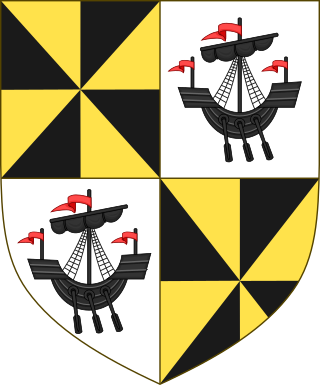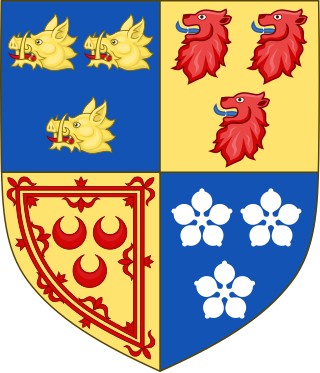
Robert Stewart, Duke of Albany was a member of the Scottish royal family who served as regent to three Scottish monarchs. A ruthless politician, Albany was widely regarded as having murdered his nephew, the Duke of Rothesay, and brother to the future King James I of Scotland. James was held in captivity in England for eighteen years, during which time Albany served as regent in Scotland, king in all but name. He died in 1420 and was succeeded by his son, Murdoch Stewart, Duke of Albany, who was executed for treason when James returned to Scotland in 1425, almost causing the complete ruin of the Albany Stewarts.

Colin Campbell, 1st Earl of Argyll was a medieval Scottish nobleman, peer, and politician. He was the son of Archibald Campbell, Master of Campbell and Elizabeth Somerville, daughter of John Somerville, 3rd Lord Somerville. He had the sobriquet Colin Mulle, Bold Earl Colin.
Patrick Hepburn, 1st Earl of Bothwell was Lord High Admiral of Scotland. He rose to political prominence after supporting James IV against his father, and was proxy at the King's marriage.
George Gordon, 4th Earl of Huntly was a Scottish nobleman.

James Hamilton, 1st Earl of Arran and 2nd Lord Hamilton was a Scottish nobleman, naval commander and first cousin of James IV of Scotland. He also served as the 9th Lord High Admiral of Scotland.
Thomas Boyd, Earl of Arran was a Scottish nobleman.

William Cunningham, 9th Earl of Glencairn (1610–1664), was a Scottish nobleman, Lord Chancellor of Scotland, and a cavalier. He was also the chief of Clan Cunningham.
William Ruthven, 2nd Lord Ruthven was a Scottish nobleman. He served as an Extraordinary Lord of Session and Keeper of the Privy Seal.

James Hay, 15th Earl of Erroll styled Lord Boyd from 1728 to 1746, was a Scottish nobleman and the son of William Boyd, 4th Earl of Kilmarnock. After his father was attainted in 1746, he became Mr James Boyd, but in 1758 he inherited the Earldom of Erroll from a great-aunt.
James Stewart, 1st Earl of Buchan (1442–1499) was a Scottish noble. He was the uncle of James III of Scotland who granted him the Earldom of Buchan in 1469. Buchan repaid his nephew by fighting for his cause against rebellious southern barons. Through his marriage to Margaret Ogilvy he acquired the title Lord Auchterhouse.
George Douglas, 1st Earl of Angus (1380–1403) was a Scottish nobleman and peer.

Alexander Seton, 1st Earl of Huntly, who adopted the family name of Gordon from about 1457, was a powerful 15th-century Scottish magnate. He was knighted in 1439/1440 and was Lord of Badenoch, Gordon, Strathbogie and Cluny.

John Hope, 2nd Earl of Hopetoun was a Scottish aristocrat.

Sir Walter de Haliburton, 1st Lord Haliburton of Dirleton, Lord High Treasurer of Scotland was a Scottish noble.
Mary Stewart, Countess of Arran was the elder daughter of King James II of Scotland and Mary of Guelders. King James III of Scotland was her eldest brother. She married twice: firstly, to Thomas Boyd, 1st Earl of Arran; secondly, to James Hamilton, 1st Lord Hamilton. It was through her children by her second husband that the Hamilton earls of Arran and the Stewart earls of Lennox derived their claim to the Kingdom of Scotland.
Anne Woodville, Viscountess Bourchier was an English noblewoman. She was a younger sister of Queen Consort Elizabeth Woodville to whom she served as a lady-in-waiting. Anne was married twice; first to William Bourchier, Viscount Bourchier, and secondly to George Grey, 2nd Earl of Kent. Anne was the grandmother of the disinherited adulteress Anne Bourchier, 7th Baroness Bourchier, and an ancestress of Robert Devereux, 2nd Earl of Essex.
John Somerville, 3rd Lord Somerville was the son of William Somerville, 2nd Lord Somerville and Janet Mowat. He was a member of the Scottish Parliament. In 1449 he fought with the Scots who defeated the English at Sark. He was also present at the siege of Roxburgh in 1460 during which James II of Scotland died.
Elizabeth FitzHugh also known as Lady Elizabeth Parr. She was an English noblewoman and lady-in-waiting to her cousin, Anne Neville, queen consort of King Richard III. She was grandmother of Catherine Parr, sixth queen consort to King Henry VIII, and her siblings Anne Herbert, Countess of Pembroke, and William Parr, 1st Marquess of Northampton.
James Lindsay, 7th Lord Lindsay PC, Scottish landowner who was a gentleman of King James's bedchamber.

Dorothea Stewart, Countess of Gowrie was a Scottish aristocrat. The dates of the birth and death of Dorothea Stewart are unknown.








